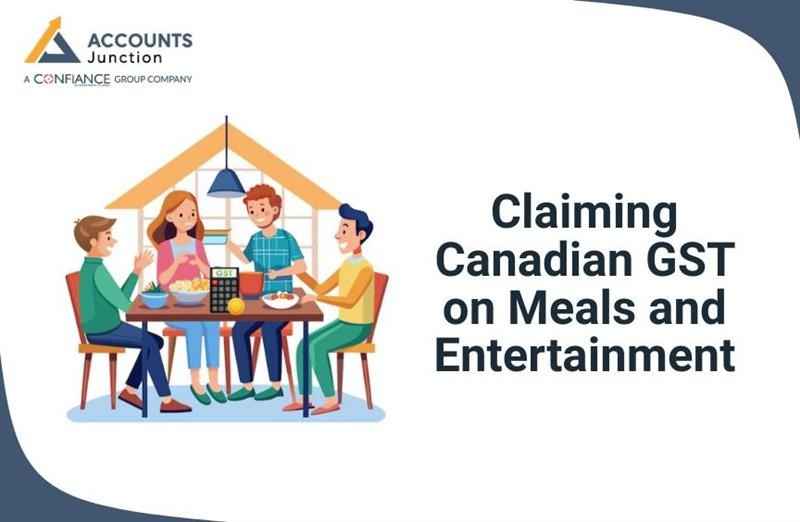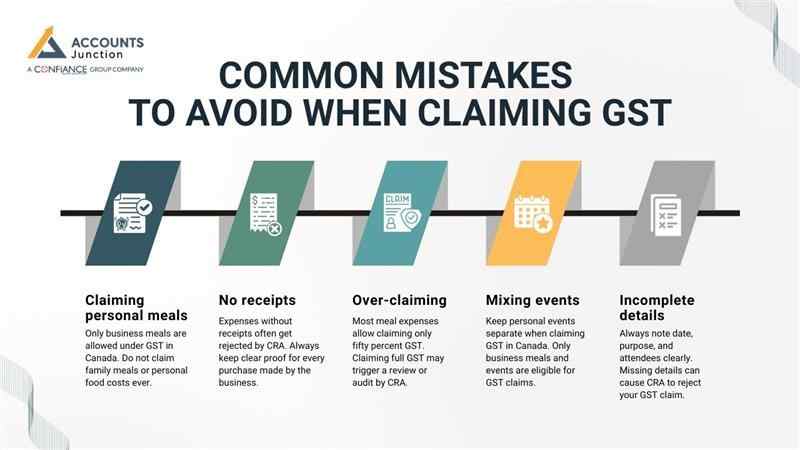
Claiming Canadian GST on Meals and Entertainment
Businesses in Canada often spend money on meals and events. These costs may include client lunches, staff parties, or work travel meals. When you pay for these items, you also pay GST or HST. Knowing how to claim Canadian GST on Meals and Entertainment helps business owners save money and avoid errors. This guide explains the rules clearly.
Managing these costs properly can help track spending under the GST in Canada rules. By keeping receipts and records, businesses can avoid issues with the tax authorities. Good tracking ensures you only claim what is allowed and reduces the risk of mistakes.
What is GST/HST?
GST is a federal tax on most goods and services in Canada. HST is a combined tax in some provinces. It includes GST and provincial sales tax. GST is 5%, while HST ranges from 13% to 15%, depending on the province. Businesses registered for GST/HST can claim credits on certain expenses, including meals and events.
What Counts as Meals and Entertainment?
Meals and event costs cover spending for business use. These may include:
- Meals with clients or business partners
- Meals while traveling for work
- Tickets to shows, sports, or concerts for business
- Staff parties or celebrations
Personal expenses or lavish events may not count. The Canada Revenue Agency (CRA) sets rules for what is a true business expense.
1. GST IN CANADA
The Federal GST (Goods and Services Tax), a 5 percent tax on most Canadian goods and services, began on January 1, 1991, replacing the hidden 13.5% Manufacturer's Sales Tax. The rate of GST differs in every sector like we’ll have different in the industrial sector and other in food and entertainment.
Goods and Service Tax in Canada means it is a federal sales tax of 5 percent levied on most transactions in Canada, such as retail purchases, real estate sales and personal services.”
When to register for and start charging the GST: Find out if you have to register and start charging the GST/HST
- Open or manage an account: Register for, change or close a GST/HST account.
- Charge and collect the tax
Determine which rate to charge, manage receipts and invoices, and learn what to do with the tax you collect.
- Complete and file a return
Calculate your net tax, and complete, file, or correct a return.
- Remit (pay) the tax you collected
When and how to remit (pay) the tax, including by installments.
2. Claiming of GST on Meals and Entertainment
You can claim meals when you're traveling. If an employee has a meal in a restaurant while traveling for work purposes the expense is tax-deductible and exempt from fringe benefits tax.
Self-employed individuals will claim food, nutrient and diversion expenses once these expenses area units incurred for the aim of earning financial gain from a business or property.
If you're in operation your business as a sole proprietary or partnership, claiming your business expenses is a component of finishing type T2125, Statement of Business or skilled financial gain as a part of your T1 revenue enhancement come back.
For a lot of on revenue enhancement for Canadian sole proprietors and partnerships see:
- Canadian revenue enhancement and Your Small Business Tax
- Canadian revenue enhancement FAQs for tiny Businesses
- How to finish the T1 Canadian revenue enhancement type as a Business
- How to Calculate the cost of capital Allowance
If you're in operation your business as a company, you may claim meals and diversion expenses below in operation expenses (8523) once you area unit victimization the final Index money|of monetary|of economic} data (GIFI) to finish your financial data statement on your T2 company revenue enhancement come back.

3. The requirement of bills for a valid claim of GST
All of your claimed business expenses on your income tax return need to be supported with original documents, such as receipts. Without the "evidence" of receipts for your claimed business expenses, the Canada Revenue Agency may decide to reduce the number of expenses you have deducted. The only exception is on Claiming Meal and Vehicle Travel Expenses Without Receipts for rest others claiming GST you should have verified required documents.
How Much GST Can Be Claimed?
Claiming Canadian GST on Meals and Entertainment is not always straightforward. You may only claim part of the GST, depending on the situation. For most business meals, only 50% of the GST or HST can be claimed. This limit includes client lunches or dinners, travel meals, and staff events. CRA guidelines suggest splitting personal enjoyment costs from business purpose costs.
Some exceptions may allow full GST claims. For example, meals included in accommodation bills while traveling may be fully claimed. Keeping a clear note of the purpose for the expense is essential. Businesses can save a significant amount if they track these amounts correctly.
Record-Keeping Tips for Meals and Entertainment
- Good records are key to claiming GST in Canada correctly. Detailed records help avoid mistakes later.
- Receipts are the first step. Collect receipts right after each expense.
- Each receipt should show:
- Date, cost, and supplier details for GST in Canada claims.
- This proves the expense if CRA asks.
- Note the business purpose and attendees. Explain why the meal or event was needed.
- Digital copies are fine if clear and legible. Make sure scans or photos are easy to read.
- Use a spreadsheet or accounting software. Software can sort and total expenses automatically.
- Categorize meals, travel, and entertainment separately. This makes GST filing simple and fast.
- Attach receipts to invoices in your software. Linking receipts avoids lost or missing documents.
- Organized records reduce errors and smooth audits. Auditors can check your claims without delays.
Common Mistakes to Avoid When Claiming GST
Claiming GST on meals and events can cost money fast. Some mistakes may trigger audits and stress for your business.
- Claiming personal meals: Only business meals are allowed under GST in Canada. Do not claim family meals or personal food costs ever.
- No receipts: Expenses without receipts often get rejected by CRA. Always keep clear proof for every purchase made by the business.
- Over-claiming: Most meal expenses allow claiming only fifty percent GST. Claiming full GST may trigger a review or audit by CRA.
- Mixing events: Keep personal events separate when claiming GST in Canada. Only business meals and events are eligible for GST claims.
- Incomplete details: Always note date, purpose, and attendees clearly. Missing details can cause CRA to reject your GST claim.
Avoid these mistakes to keep all GST claims valid. Following rules reduces stress during audits and financial reviews.
Benefits of Proper GST Claims
- Claiming Canadian GST on Meals and Entertainment correctly can lower your costs. You recover tax paid on business purchases.
- Proper tracking improves cash flow under Canadian GST on Meals and Entertainment. Knowing expenses helps plan future spending.
- Shows where money is spent and aids financial management. You can spot areas to reduce costs.
- Good GST practices may prevent CRA penalties. Avoid fines or extra interest from errors.
- Builds a stronger financial record over time. Accurate records make reports more reliable.
- Employees benefit from correct reimbursements. They get proper payments for meals and travel.
- Clients feel valued when events are well-documented. Clear records leave a good impression.
- Proper GST claims support business growth and efficiency. Efficient processes free up time for core work.
Claiming GST on meals and events properly is more than saving money. It helps your business follow the rules, avoid mistakes, and keep finances clear. By keeping receipts, writing down the reason for each expense, and separating personal costs, your GST claims stay smooth and correct. Good records also help if CRA checks your business.
Accounts Junction helps businesses in Canada handle GST claims easily. Our team tracks, records, and claims meals and event costs the right way. With our services, you save time, cut errors, and keep your business in line with the rules while getting the tax credits you can.
FAQs
1. Can I claim GST on coffee meetings with clients?
- Yes, small coffee meetings may qualify if clearly for business purposes. Record date, attendees, and business topic.
2. Do gift cards for staff count as meals and entertainment?
- Not always. CRA may treat them as a taxable benefit, not a business expense.
3. Can I claim GST on event tickets for clients under GST in Canada?
- Yes, tickets may qualify if the purpose is business-related and documented properly.
4. Are business travel meals fully claimable under Canadian GST on Meals and Entertainment?
- Often, only 50% is allowed, unless included in accommodation or package deals.
5. Can I claim GST without receipts if the amount is small?
- CRA may allow exceptions for minor travel or meal costs, but receipts are preferred.
6. Are alcohol expenses part of claimable meals?
- Only if it is a reasonable part of the business meal, but limits may apply.
7. How long should I keep receipts for GST claims?
- At least six years in case CRA requests proof of expenses.
8. Can I claim GST for client appreciation dinners?
- Yes, if they are directly related to business activities and properly recorded.
9. Are office snacks claimable under meals and entertainment under Canadian GST?
- Typically not, unless purchased for meetings with clients or staff events.
10. Can a sole proprietor claim full GST on meals?
- Most meals are limited to 50%, even for sole proprietors, unless exceptions apply.
11. Is it okay to mix personal and business meals in one receipt?
- No, you should separate personal from business meals to avoid claim issues.
12. Can GST claims be audited by CRA?
- Yes, CRA may audit any claims to ensure accuracy and eligibility.
13. Do I need special software for tracking GST claims?
- Not required, but accounting software can simplify tracking and reduce mistakes.
14. Can meals during conferences be claimed under Canadian GST?
- Yes, if the meal is business-related and properly documented with receipts.
15. Does the type of restaurant affect GST claims?
- No, CRA focuses on business purpose rather than restaurant type.
16. Can I claim GST on meals while attending a business seminar?
- Yes, meals during seminars may qualify if the purpose is business-related.
17. Are hotel restaurant bills included in GST claims?
- Yes, if the meals are for business travel, GST can usually be claimed.
18. Can a partnership claim GST on client lunches?
- Yes, partnerships can claim GST, usually up to 50% of the meal cost.
19. Do meal expenses need a separate GST invoice?
- Yes, having a detailed invoice helps support your GST claim.
20. Can I claim Canadian GST on Meals and Entertainment for catering at office events?
- Yes, catering for business purposes is eligible, but personal portions may be excluded.
21. Is it okay to claim GST on fast-food meals for staff?
- Yes, fast-food meals may count if they are for business meetings or events.
